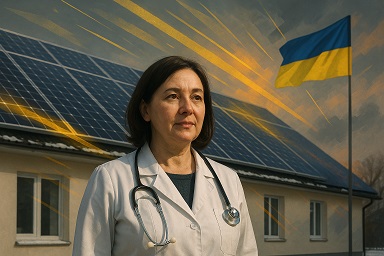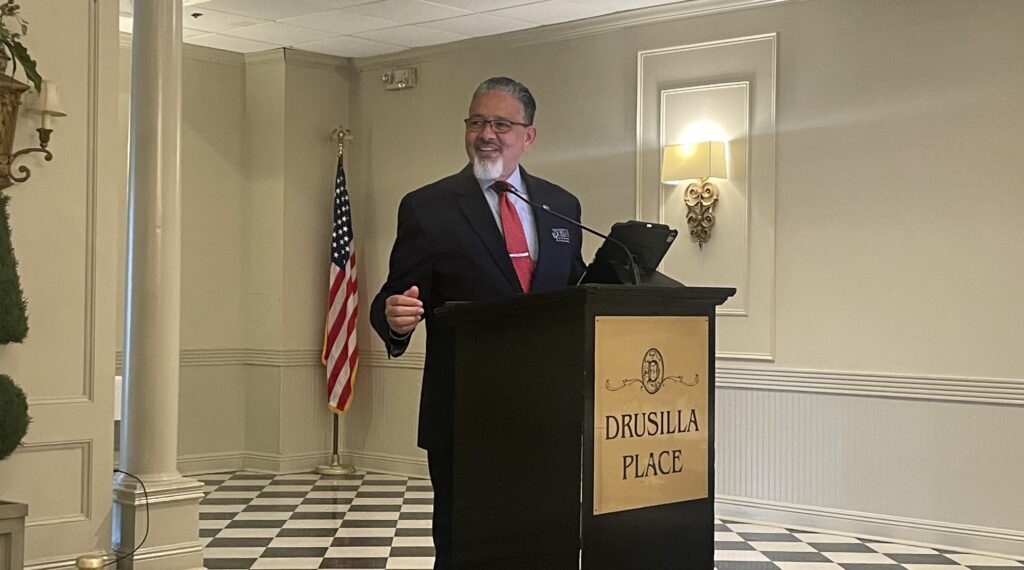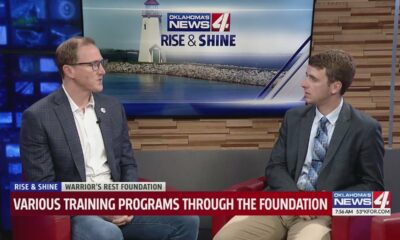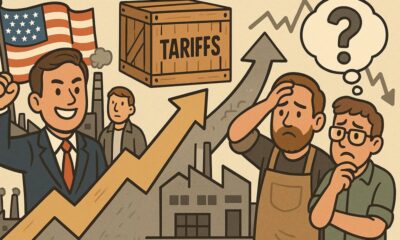News from the South - Louisiana News Feed
The perilous links between Ukraine’s energy future and Louisiana

by Delaney Nolan, Louisiana Illuminator
March 25, 2025
HOSTOMEL, Ukraine – Dr. Olena Yuzvak understands the damage of war like few others.
In February 2022, Yuzvak, her husband Oleh, and their son Dima knew that Russian forces had arrived by the sound of explosions.
“The full invasion started,” recalled Yuzvak, speaking from a quiet, sunlit room in one of her medical clinics. “The artillery and mines and helicopters started to destroy everything, and there was no electricity.”
The quiet village in the suburbs of Kyiv was suddenly the front line. Yuzvak, the physician-manager of four health clinics, began treating shrapnel wounds and concussions, making home visits with a commandeered ambulance amid constant gunfire, then treating people from home when that got too risky, relying on a neighbor’s generator for power.
“But we didn’t have medicine,” like insulin, she recalled, partly a result of blackouts.
A month into the invasion, Yuzvak heard screaming from her front yard. She rushed out to find Dima, 25, pleading with Russian soldiers who’d shot her husband twice in the leg. The family was bundled off, bags put over their heads. After two days of interrogation, Olena was freed. Oleh was returned after a month. But Dima is still being held in Russia.
Still, she’s continued her work.
Yuzvak walks outside and points to the clinic’s roof, where solar panels gleam under a dusting of snow. Rebuilt after missile damage, her Hostomel clinic now runs completely on solar from May to October. That kind of reliability, she says, is critical, and has made the facility a pillar for the area, even during wartime blackouts.
“People can come anytime, when there is no electricity or heating, and they can have a tea, warm up, watch TV because we always have electricity,” Yuzvak said.
She’d like to continue the shift to renewable energy sources, as it allows the clinics to be more independent – and thereby more secure. For the rest of the year, they supplement with electricity from the grid, which has been widely damaged by Russian attacks.
Ukraine is hedging its energy security, in part, on Louisiana. In December, as part of a gambit to replace Russia as the gas hub for Europe, Ukraine received its first shipment of liquefied natural gas (LNG) from the United States. Exported from a Venture Global terminal in Plaquemines Parish, it’ll be held in Ukraine’s gas storage tanks – the largest in Europe – before being piped around the region.
The Trump administration has framed LNG as a win, part of an “energy dominance” plan that will provide security for Europe amid sanctions on Russian gas. Since the invasion, the European Union has banned imports of Russian coal and nearly all Russian oil and pipeline gas.
But some energy and national security experts in the U.S. and Ukraine suggest that embracing LNG will primarily benefit the industry, pose security concerns for Ukraine, raise U.S. energy prices and threaten the health of the Gulf of Mexico.
Ukraine turns to Louisiana for LNG
Ukraine’s largest private energy company, DTEK, has agreed to buy LNG from Venture Global through the end of 2026. Earlier this month, Trump administration officials visited the company’s Plaquemines export terminal and stood alongside Venture Global CEO Mike Sabel as they announced plans to make it the largest one in the country.
The rapid LNG buildout on the Gulf Coast accelerated after Russia’s 2022 invasion of Ukraine, as European countries panicked over gas shortages and scrambled to increase imports of U.S. gas. Though the much-feared shortages never materialized, the war still wound up being a boon to the industry.
“American LNG has created a lot of security of supply, both for Ukraine and Europe in general,” said James O’Brien, head of LNG at DTrading, the international trading arm of DTEK.
O’Brien added that much depends on what happens at the war’s end, but most likely “there will be more increased reliance on American [LNG] and maybe some other sources. But the really fast ramp-up of U.S. LNG production over the last eight, nine years has been quite amazing.”
The bulk of that ramp-up has come from Louisiana, now the biggest LNG exporter in the country. That’s helped make Venture Global a darling of the Trump administration. When his Energy and Interior secretaries visited the Plaquemines terminal last week, they gave speeches praising the company.
GET THE MORNING HEADLINES.
O’Brien likewise said an end to the war “could be amazing potential for American companies in Ukraine.” If Trump wants to balance trade deficits, “LNG is a quick, easy win for him” as “Ukraine is like a new market ready to be opened up, and it could be one of the biggest economic success stories of our time.”
But DTEK picked a beleaguered partner when it signed with Venture Global in June 2024. The company is embroiled in lawsuits with multiple clients, including BP and Shell, over unfulfilled contracts. Two environmental organizations also recently filed a 60-day notice of intent to sue over Clean Air Act violations at a Cameron Parish terminal.
Last month, the CEO of TotalEnergies, a French petroleum corporation, declined to take LNG from the Plaquemines terminal, citing a lack of trust.
“I don’t want to deal with these guys,” Patrick Pouyanne told Reuters.
That turmoil has contributed to a class action lawsuit brewing against Venture Global by its own investors.
And amid it all, Venture Global share prices have “cratered,” losing about 50% of their value since going public in January.
LNG in Louisiana communities
Louisiana shrimpers and fishers have, for years, protested and litigated against Venture Global, which has five LNG projects planned in the state. They argue its terminals damage fishing grounds, destroying their livelihoods. Nearby residents complain of the pollution and erosion the Plaquemines terminal causes, while the company receives billions in state tax breaks. Locals have reported an increase in already-high levels of illnesses among adults and children, including cancer and unexplained rashes.
Regardless, on Wednesday, Trump’s Department of Energy authorized exports from Venture Global’s CP2 terminal in Cameron Parish, which has contracted 10% of its supply to Ukraine.
DTEK says Venture Global has been a reliable partner. When asked about adverse impacts to Louisiana, O’Brien said they fall under Venture Global’s purview.
“They’re the ones responsible for that. This is something they should be looking after,” he said.
But Henry McAnespy, a retired fisherman and Lake Hermitage resident, warns the Plaquemines terminal near his home does not seem to be responsibly run.
“We’ve been concerned about the flaring – a lot of black smoke and a kind of reddish fire at times,” McAnespy said.
He said the plant flares every day, all day – even though Venture Global told the Federal Energy Regulatory Commission in its environmental impact statement that flaring at that terminal “may occur up to forty times a year. Venture Global does not anticipate any other flaring/venting during normal operating conditions.” He added that he hears constant alarms from the plant, which sound for hours, sometimes waking him up at night.
The pattern of excessive flaring McAnespy reports witnessing mirrors the near-daily flaring documented in the pending lawsuit against Venture Global’s Cameron Parish terminal.
Fossil fuels are ‘always going to be vulnerable’
So far, American LNG has not succeeded in displacing Russian LNG, which isn’t sanctioned like piped gas. Russian LNG supplies to Europe have actually increased since the start of the full-scale invasion in 2022.
LNG imports can also present national security risks according to Mike Wallin, CEO of the American Security Project, a nonpartisan think tank.
“Generally speaking, fossil fuels are always going to be vulnerable,” Wallin told the Louisiana Illuminator.
Because fossil fuels are sold on the global marketplace, conflicts, wars or economic shifts in any one region can cause price shocks or supply shortages. Ukraine President Volodymyr Zelenskyy has also suggested Trump’s proposal to mine rare earth minerals in his country would allow Ukraine to build LNG import terminals, but these facilities on the Black Sea would be vulnerable to Russian attacks, Wallin said.
YOU MAKE OUR WORK POSSIBLE.
Renewable energy, on the other hand, tends to be more secure, because it’s “much more centralized, because it’s in your own country. You’re not depending on outside resources,” he said.
Wallin added that as Russia’s been attacking infrastructure, the Ukrainian energy industries have been looking into and building renewables for resiliency.
“It’s easier to stand up a windmill, or solar panels wired up to some houses, than it is to build an entire gas-burning power plant,” he said.
Some Ukrainians echo that viewpoint.
“Fossil fuel companies and their political allies in the United States have capitalized on the horrific war we are experiencing in Ukraine to justify” LNG exports, said Svitlana Romanko, founder of Razom We Stand, an organization calling for a permanent embargo on Russian fossil fuels.
Fossil fuels are “fueling global energy insecurity and autocrats’ expansion. In Ukraine, we don’t want more LNG. We need decentralized renewable energy sources,” Romanko said.
DTEK itself states that “Russia has used energy as a geopolitical weapon” and “by creating a strong, decentralized and low-carbon energy system, Ukraine can limit its exposure to Russian aggression.”
The nation has faced constant attacks on its conventional power plants, and Russia currently occupies Zaporizhzhia, home to the largest nuclear power plant in the world.
“Things like microgrids can help in the resilience of their energy network,” Wallin said. “And I think they’ve been forced to learn this rather quickly.”
Renewables could make Ukraine a ‘green powerhouse’
Three years of Russian attacks have already spurred a buildout of renewable-powered microgrids for critical infrastructure in Ukraine, such as schools, water utilities – and Yuzvak’s clinic.
“We are 100% independent,” said Yuzvak, pointing to the glinting solar panels on the roof of the rebuilt clinic in Hostomel.
Fences in this neighborhood are still riddled by bullet holes. The shell of a bombed house looms behind the nearby Mushchyn clinic. But both are solid and gleaming and – with the help of Greenpeace and EcoAction, a Ukrainian renewables advocacy organization – boast solar panels, battery packs and heat pumps. Even amid a blackout, they’ll no longer need to find fuel for generators, which was difficult and expensive.
EcoAction has established 15 other sites in Ukraine with renewable microgrids. The challenge is scaling up.
DTEK recently announced plans to quadruple the size of its wind farm near the Black Sea. It’s the single largest private investment in Ukraine since Russia launched its invasion in 2022. At that size, it would produce enough electricity for 900,000 Ukrainian homes.
The shift to renewables helps shield Yuzvak’s clinic from another source of instability: the Trump administration.
Even as donated Tesla batteries help power the clinic, much of the Ukrainian health system relies on funding from the U.S. Agency for International Development (USAID). Since Elon Musk dismantled the agency, Yuzvak and her colleagues, whose salaries came from Ukraine’s USAID-reliant Ministry of Health, have struggled.
“We don’t even have enough to pay the employees’ salary,” she explained. The hospital has had to lower its budget and change what they charge patients as a result.
But being energy independent helps ease some of the clinic’s financial pressure. It has reduced its heating costs by 80%, according to EcoAction.
“We’d like to have a solar plant,” Yuzvak said. “We have projects, but we don’t have the finances.” She and other health care providers planned to construct a fifth hospital with solar panels, but the project was dependent on USAID funding. Now its future is uncertain, like so much else in Yuzvak’s life.
Yuzak said she sometimes gets information about her son from freed POWs. She knows where Dima is, and that he is in poor health. But she didn’t disclose the prison where he’s being held, “because then they’ll transfer him to another one, and during this transportation, they get beaten and tortured again,” she said, her voice strained.
Meanwhile, any goodwill created by the donated Tesla batteries has evaporated.
“We didn’t even need these toys that Musk and USAID are bringing us. We had enough electricity before,” Yuzvak said. “Now, my son being in captivity is the result [of U.S. policy] because we are just instruments in this war.”
“The mood is changing in the speech of the politicians,” she added. “But after what we went through, what we survived – nothing can make us silent.”
This reporting was supported by the International Women’s Media Foundation’s Women on the Ground: Reporting from Ukraine’s Unseen Frontlines Initiative in partnership with the Howard G. Buffett Foundation.
Louisiana Illuminator is part of States Newsroom, a nonprofit news network supported by grants and a coalition of donors as a 501c(3) public charity. Louisiana Illuminator maintains editorial independence. Contact Editor Greg LaRose for questions: info@lailluminator.com.
The post The perilous links between Ukraine’s energy future and Louisiana appeared first on lailluminator.com
News from the South - Louisiana News Feed
Easter Weekend: Muggy, warm, and windy

SUMMARY: Easter Weekend will be warm, muggy, and breezy, with mostly cloudy skies and temperatures in the low 80s. Current conditions are in the low 70s, making it a sticky day for events like the Crescent City Classic. While there’s a slight chance of rain on Sunday, most of the day will remain dry. Winds from the southeast could gust near 30 mph. Next week, a front will bring increased rain chances and storms starting Monday, with unsettled conditions continuing into Tuesday and Wednesday. Despite this, warm temperatures in the 80s will persist throughout the week.

Easter Weekend looks very nice! It will be hot, humid, and windy with high temperatures in the lower 80s both afternoons. More clouds will be around with some breaks
News from the South - Louisiana News Feed
Vicente Fernandez and Freddy Fender join National Recording Registry

SUMMARY: This year, Vicente Fernandez’s “El Rey” and Freddy Fender’s “Before the Next Teardrop Falls” were inducted into the National Recording Registry, alongside Lin-Manuel Miranda’s *Hamilton* album. Congressman Joaquin Castro has championed the inclusion of more Latino artists in the registry, noting that Latino representation is only 5%. Over the last three years, with input from constituents, Castro has successfully nominated 30 songs and albums, including iconic Latino tracks. He advocates for more Latino contributions to be recognized, including Selena’s work. Castro will continue gathering nominations for 2026, aiming to better reflect Latino cultural influence in the registry.

Each year since 2000, the Library of Congress has selected influential songs and albums to be preserved in the National Recording Registry. This year, three Latino artists were inducted — two of them with deep roots in Latino culture and South Texas.
News from the South - Louisiana News Feed
Q&A with University of Louisiana System President Rick Gallot on higher education

by Piper Hutchinson, Louisiana Illuminator
April 18, 2025
This is an interview with University of Louisiana System President Rick Gallot that took place earlier this month about how the legislative session and federal changes will impact higher education in Louisiana. It has been edited for length and clarity.
You can also listen to a version of this interview on our new podcast The Light Switch.
Piper Hutchinson: What do you think is coming for higher education this session?
Rick Gallot: I think certainly starting with a standstill budget is always better than starting with a proposed cut. So, you know, we’re certainly very grateful for that. I think there’s a lot of uncertainty, coming out of Washington and with the constitutional amendments that did not pass, obviously that has created some angst in terms of what do we do now, right? And so I think there is, again, just an overall level of uncertainty that we’ll see it … kind of play out over time.
I think if you look at the increased revenue from the sales, sales taxes and other things, we’re certainly not in a real bad spot right now as a state in terms of our finances. So I’m still optimistic that we will work through the challenges in the session, and we will come out good on the other side.
Hutchinson: Looking at the bills that we have so far, what do you think is going to be the most impactful for higher education?
Gallot: It’s hard to say, and when you look at what’s filed versus what ultimately makes it through the process; all bills filed on the front end don’t always make it. Rep. (Emily) Chenevert has come back with another diversity, equity and inclusion bill. We will certainly have to see how that plays out. The bill she had last year started one way and ended up another. … Certainly with all other higher ed leaders, she was very receptive to meeting with us and working through some of those challenges last year. At the end of the day, I think the budget is always going to be the main focus that could impact the trajectory going forward.
Hutchinson: There’s one bill that’s going to have a big impact for your system, talking about transferring UNO back to the LSU System. What should we expect on that front?
Gallot: For me personally, it’s a full-circle moment. I was in the house when UNO was transferred from LSU to the University of Louisiana System. You know, I just want what’s best for the students, for the campus community at the University of New Orleans. It is a legislative prerogative. They have the authority to transfer universities from one system to the other. So if this legislation is successful, we will certainly do our part to ensure that it is a seamless transition. We will work with LSU, with Board of Regents and with the legislature to ensure that the transition is as smooth as it could possibly be.
Hutchinson: What’s that like for you [as a former legislator] during the legislative session, being kind of outside the rails?
Gallot: Well, I certainly have a lot of respect for our legislators and the sacrifices they all make in serving. I’m a huge fan of Stephen Covey’s “Seven Habits,” and one of those is: “Seek, first to understand then to be understood.” And so I think that’s helpful to understand the pressures that our legislators are under, knowing that there’s a lot that they have to balance. I think it’s helpful, quite frankly. And I don’t think I burned any bridges while here.
I mean, I did oversee redistricting, so maybe I did [burn] one or two. But for the most part, I still have good relationships with many of my former colleagues … who are still there. I’m grateful to have the opportunity to be a part of the process but from this side.
Hutchinson: There has been a little bit of controversy in the LSU System lately, that’s reignited these conversations about curbing tenure. What are you hearing on that front, and what would that mean for higher education as a whole if they did take an axe to tenure?
Gallot: Going back to COVID, and you think about faculty members, who go through the process of, not only a bachelor’s and a master’s and a terminal degree. You know, they get hired, they’re on a tenure track, they’re researching, they’re writing, they’re building their portfolio, and at the appropriate time they apply for tenure. I think we have to respect that process.
I think it is one that is deeply rooted in higher education, and so I think we certainly have to respect faculty and that they have earned this.
Now, having said that, it’s always one or two bad apples that will spoil the barrel, as they say. I don’t know that simply doing away with tenure is the answer.
If the legislature passes something, then we, as a state system, will certainly abide by whatever changes may be made. I think we want accountability at all levels, that we want our students to be in the best position to learn. We want our faculty to be in the best position to teach, and that our students would graduate and go out and make a difference in society. So we’ll certainly be watching it closely, and hopefully we will see thoughtful debate throughout the process. And again, with whatever the ultimate result is, we will work with it.
Hutchinson: I can’t not talk about what’s going on at the federal level. We’re talking about cutting research funding. There are concerns about immigration and graduate students, and certainly tariffs could increase expenses for higher education. How is the UL System adapting to all of this?
Gallot: Right now there’s so much uncertainty just across the board. Whether it’s the potential loss of research funding and indirect cost, for instance, universities build their budgets based upon what they believe the revenue stream will be from these research grants. I’m hopeful that we will sort of get through this period of uncertainty, and we will see things sort of settle down to be a little more predictable. But you know, at the same time, we will have to adjust if the rules are changed. If the funding formulas are changed, we will just have to adapt. We always have and we always will.
GET THE MORNING HEADLINES.
YOU MAKE OUR WORK POSSIBLE.
Louisiana Illuminator is part of States Newsroom, a nonprofit news network supported by grants and a coalition of donors as a 501c(3) public charity. Louisiana Illuminator maintains editorial independence. Contact Editor Greg LaRose for questions: info@lailluminator.com.
The post Q&A with University of Louisiana System President Rick Gallot on higher education appeared first on lailluminator.com
-

 Mississippi Today6 days ago
Mississippi Today6 days agoLawmakers used to fail passing a budget over policy disagreement. This year, they failed over childish bickering.
-

 Mississippi Today6 days ago
Mississippi Today6 days agoOn this day in 1873, La. courthouse scene of racial carnage
-

 Local News6 days ago
Local News6 days agoSouthern Miss Professor Inducted into U.S. Hydrographer Hall of Fame
-

 News from the South - Alabama News Feed5 days ago
News from the South - Alabama News Feed5 days agoFoley man wins Race to the Finish as Kyle Larson gets first win of 2025 Xfinity Series at Bristol
-

 News from the South - Alabama News Feed5 days ago
News from the South - Alabama News Feed5 days agoFederal appeals court upholds ruling against Alabama panhandling laws
-

 News from the South - Florida News Feed7 days ago
News from the South - Florida News Feed7 days agoSevere weather has come and gone for Central Florida, but the rain went with it
-

 News from the South - Alabama News Feed7 days ago
News from the South - Alabama News Feed7 days agoBellingrath Gardens previews its first Chinese Lantern Festival
-

 News from the South - Texas News Feed6 days ago
News from the South - Texas News Feed6 days ago1 dead after 7 people shot during large gathering at Crosby gas station, HCSO says








































